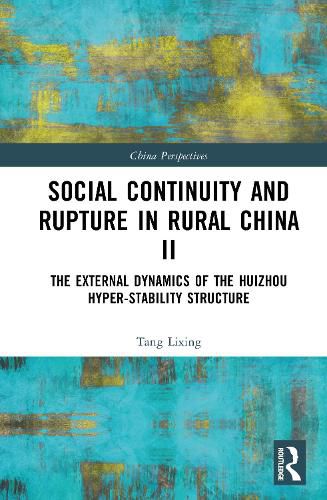Readings Newsletter
Become a Readings Member to make your shopping experience even easier.
Sign in or sign up for free!
You’re not far away from qualifying for FREE standard shipping within Australia
You’ve qualified for FREE standard shipping within Australia
The cart is loading…






As the second volume of a two-volume set that examines the distinctive social structure and governance of Huizhou, China, this book focuses on the external factors that influence and renew social functioning.
From the sixteenth century to the first half of the twentieth century, Huizhou, a historic region in what is now Anhui Province in China, was characterized by longterm social stability and prosperity. Even during times of war and unrest, Huizhou was able to quickly restore order. This two-volume study explores the reasons for this stability and its relevance and implications for contemporary society. In this second volume, the author examines a group of 'outsiders' to Huizhou society, who conducted business outside the region while maintaining their hometown and linking their social networks from both urban and rural Huizhou. The book discusses how local tradition and rural governance were sustained through wars and social unrest. It also illustrates how a new, modernized order was re-established after the devastation of war and communist reform in the twentieth century.
The title will appeal to scholars and students of Chinese history, the social and economic history of modern China, and readers interested in China's transition to modernity.
$9.00 standard shipping within Australia
FREE standard shipping within Australia for orders over $100.00
Express & International shipping calculated at checkout
As the second volume of a two-volume set that examines the distinctive social structure and governance of Huizhou, China, this book focuses on the external factors that influence and renew social functioning.
From the sixteenth century to the first half of the twentieth century, Huizhou, a historic region in what is now Anhui Province in China, was characterized by longterm social stability and prosperity. Even during times of war and unrest, Huizhou was able to quickly restore order. This two-volume study explores the reasons for this stability and its relevance and implications for contemporary society. In this second volume, the author examines a group of 'outsiders' to Huizhou society, who conducted business outside the region while maintaining their hometown and linking their social networks from both urban and rural Huizhou. The book discusses how local tradition and rural governance were sustained through wars and social unrest. It also illustrates how a new, modernized order was re-established after the devastation of war and communist reform in the twentieth century.
The title will appeal to scholars and students of Chinese history, the social and economic history of modern China, and readers interested in China's transition to modernity.